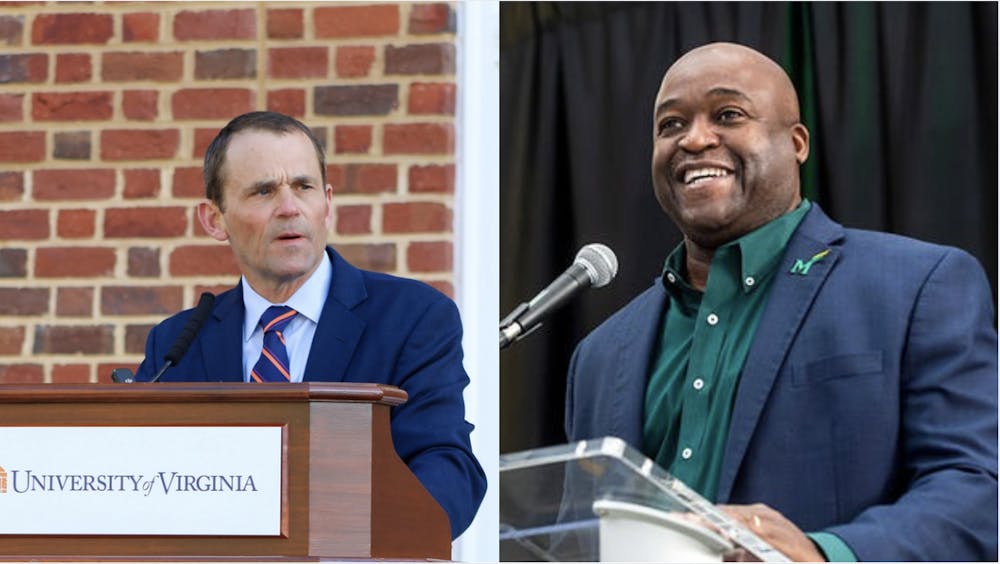Following weeks of pressure from the federal government and several concurrent federal investigations from the Justice Department and the Department of Education, the Board of Visitors at George Mason University voted Aug. 1 to maintain President Gregory Washington’s employment contract despite recent scrutiny of his leadership.
Just two weeks after former University President Jim Ryan’s resignation June 27, the Department of Education’s Office for Civil Rights opened its first investigation into GMU’s employment practices July 10, setting off a flurry of claims against President Washington’s leadership. The ED claimed this investigation began due to a complaint that was filed by professors at GMU about discriminatory hiring practices.
Ryan resigned following months of government pressure and claims made by the Justice Department that DEI at the University was simply renamed and repackaged. This is the same claim that Donald Trump’s presidential administration is making for their reasoning about the GMU investigation.
The official press release by the ED quoted Washington’s statements on GMU’s hiring practices with regard to diversity as further grounds for this initial investigation.
“[The university will] develop specific mechanisms in the promotion and tenure process that recognize the invisible and uncredited emotional labor that people of color expend to learn, teach, discover and work on campus,” Washington said.
In a public statement, Washington emphasized that the purpose of DEI at GMU was completely opposite to what the ED and Justice Department have claimed.
Statements from the ED also alleged that GMU had not made efforts to remove practices focused on diversity, equity and inclusion, and claimed that the DEI office had simply been renamed to the Office of Access, Compliance and Community.
“It is inaccurate to conclude that we created new university policies or procedures that discriminated against or excluded anyone. To the contrary, our systems were enhanced to improve on our ability to consistently include everyone for consideration of every employment opportunity,” Washington said.
Later, the Justice Department’s Civil Rights Division launched its first investigation against GMU July 17, also triggered by public statements from Washington regarding employment practices.
The department then opened a second investigation into GMU July 21. While the first was focused on hiring practices, the second focuses on admission practices and how benefits and scholarships are awarded. The investigation also claims it will look into antisemitism on campus and GMU’s response.
During this ongoing pressure from the federal government, both GMU and Virginia-wide chapters of the American Association of University Professors expressed concern with the government’s actions and support for Washington. The GMU chapter of the AAUP passed a vote of no confidence in its Board of Visitors July 21, calling for their Board to protect President Washington.
“The Board of Visitors has utterly failed to support President Washington and George Mason University during this period of unprecedented and increasing federal scrutiny and political targeting,” the resolution read. “The silence from the Board has become deafening.”
In order to restore their confidence, the AAUP asked the Board to publicly defend Washington, among other requests. 10 days later, the Board granted him a pay raise in reward for his work.
Even after the investigations into GMU and Washington, the GMU Board chose not to fire Washington and gave the president a small raise, consistent with the budget allotted from the General Assembly this year. In contrast, at U.Va., Ryan resigned under apparent pressure from the Justice Department.
The Trump administration has put pressure on major public institutions to eliminate DEI, which they say violates the Civil Rights Act of 1964. Alongside Secretary of Education Linda McMahon, President Donald Trump has clearly made public universities a major target of these initiatives.
Neha Bandaru, a third-year business student at GMU, commented on how investigations like this and the recent events at U.Va. affect student morale.
“It feels like you don’t really have a safe haven at school,” Bandaru said. “Knowing that as long as you want to pursue your education you can be supported by the government, that's not really a thing for us anymore.”
The Justice Department asked that GMU submit all requested information by Aug. 1, but it is unclear if it has done so.







